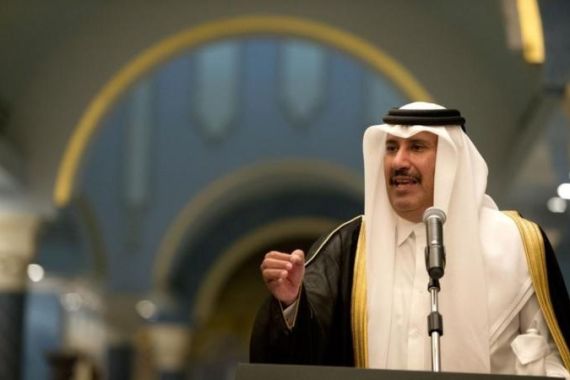Can Qatar replace its renaissance man?
One of the most powerful men in Qatar, Sheikh Hamad has led an activist foreign policy and made big investments abroad.

For the past two decades, Sheikh Hamad bin Jassim bin Jaber Al Thani – Qatar’s outgoing foreign minister and prime minister – has been one of the most powerful men in the country.
But Qatar’s new leader, Sheikh Tamim bin Hamad Al Thani, announced that he will appoint a new prime minister, Sheikh Abdullah bin Nasser Al Thani; and a new foreign minister, Dr Khalid bin Mohammad Al Attiyah.
Hamad bin Jassim, a second cousin of the former emir and a great-nephew of Qatar’s first emir, was born in 1959 and appointed foreign minister in 1992. He retained his post after a 1995 coup in which the ruling emir’s son, Sheikh Hamad bin Khalifa Al Thani, took power – and was given the post of prime minister as well in 2007.
As the country’s top diplomat, Hamad bin Jassim – also known as “HBJ” – has presided over an activist foreign policy, which has included military support for rebels in Syria and Libya and financial support for Egypt’s Muslim Brotherhood-led government. “Arms may be the only way to achieve peace” in Syria, Qatar’s foreign minister said this week.
During Hamad bin Jassim’s tenure as foreign minister, Qatar has gained a reputation as a country that is open to dealing with anyone, from the United States to the Taliban to Israel to reclusive countries such as Eritrea. Qatar has also positioned itself as a peacemaker, brokering talks among rival parties in Lebanon, between the Sudanese government and rebels in Darfur, and mediating a border dispute between Eritrea and Djibouti.
|
|
| Sheikh Tamim takes over as emir of Qatar |
Yet Qatar’s energetic foreign policy has earned it opprobrium from some in the region, and protesters in Libya and Tunisia have burned the Qatari flag at recent demonstrations. Meanwhile, some Western countries fear that arms sent to Syrian rebels may fall into the hands of hardline groups such as Jabhat al-Nusra.
Analysts say they expect few sudden policy changes under Sheikh Tamim. But Qatar may become less outspoken on the world stage without Hamad bin Jassim as foreign minister.
“It’s very unlikely in my mind that you could … send someone out to do the job that Hamad bin Jassim was doing,” said Michael Stephens, an analyst at the Royal United Services Institute. “At the end of the day, what happened with the foreign initiatives of this country was a product of [the emir and Hamad bin Jassim], and it was a combination of those two men that allowed this country to be what it was.”
Hamad bin Jassim’s stepping down may “help the crown prince in terms of securing his position without the older man there looking over his shoulder”, said Stephens, who described Sheikh Tamim as “a very capable, intelligent man”.
Kenneth Katzman, a Gulf expert at the Congressional Research Service, agreed, saying, “The emir and Hamad bin Jassim have a lot of confidence, and they take a lot of risks … Now you’re switching to a young, untested leader who does not have that reputation yet, and is feeling his way.”
Savvy investor
In addition to his two cabinet portfolios, Hamad bin Jassim has also served as chief executive of the Qatar Investment Authority (QIA), among the richest sovereign wealth funds in the world. With estimated assets of $100bn, the fund invests surpluses from Qatar’s vast oil and gas wealth in ventures abroad, to diversify the country’s fossil fuel-reliant economy, boost Qatar’s international profile, and turn a profit.
QIA has bought big stakes in companies such as German automakers Volkswagen and Porsche, Anglo-Swiss mining giant Xstrata, and French football team Paris Saint-Germain.
The fund has made especially large investments in the United Kingdom, which ruled Qatar as a protectorate until its independence in 1971. Among the Qatar Investment Authority’s British investments are stakes in department store Harrods, the London Stock Exchange and the Shard, the tallest building in the European Union – leading the Independent to call HBJ the “man who bought London”.
“Given the very little information we have” on the QIA’s performance, “it is doing great”, says Gawdat Bahgat – a professor of political science at National Defense University in Washington, DC who has written on the Gulf’s sovereign wealth funds. “They hire the top investment people from the United States, from Europe … they do not mess around with the country’s future.”
Although Sheikh Tamim, Qatar’s new emir, serves as the chairman of the QIA, the fund is “very much [Hamad bin Jassim’s] baby”, says Bahgat. Hamad bin Jassim’s position as foreign minister has likely amplified his clout when investing abroad, he said.
The QIA has not announced whether Hamad bin Jassim will step down from his position, and the Financial Times has said that “opinion is split” over whether he will stay.
Hamad bin Jassim’s shrewd business dealings have not only enriched Qatar – he is also reported to be a multi-billionaire himself.
Follow Sam Bollier on Twitter: @SamBollier